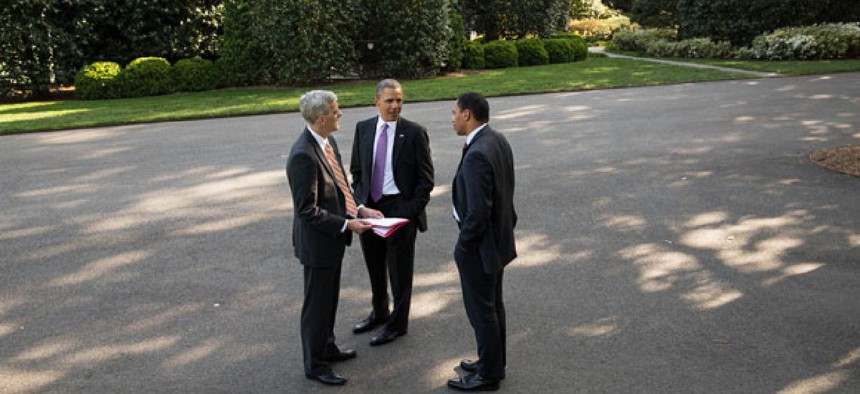
Barack Obama, Rob Nabors and Denis McDonough confer outside the White House. White House
Analysis: How Obama Scandals Threaten to Kill 'Good Government'
Emerging narrative supports claims that Washington is intrusive, incompetent, untrustworthy and heartless.
I like government. I don't like what the fallout from these past few weeks might do to the public's faith in it.
First, you don't need to be a liberal Democrat to root for government efficiency, transparency and solvency. Even tea party conservatives expect certain things from Washington: a strong military; pensions and health care for the aged; student and small-business loans; safe food and drugs; secure borders; and, of course, federal police protection against terrorists, both foreign and domestic.
The core argument of President Obama's rise to power, and a uniting belief of his coalition of young, minority and well-educated voters, is that government can do good things -- and do them well.
Damn. Look at what cliches the past few weeks wrought.
Government is intrusive. The National Security Agency is collecting records of tens of millions of customers from the nation's largest telephone companies. The secret agency is also tapping into Internet providers like Google to sift through emails, videos, photos and other activities.
They are using the data to find patterns that might reveal terrorist plots. It is an electronic fishing expedition.
Government is Orwellian. Sixty four years ago this month, George Orwell published "1984," a chilling prophecy of a police state. The book inspired the term "doublespeak," government's attempt to disguise, distort and reverse the meaning of words. It abounds.
In defending the spying on U.S. citizens, Sen. Saxby Chambliss, R-Ga., declared Thursday that "there has not been any citizen who has registered a complaint." But come on. How many complaints did he expect on a secret program?
James Clapper, the direction of national intelligence, said the program "cannot be used tointentionally target any citizen … ." That sentence is so 1984: vaguely assuring, impossible to refute, and beside the point. According to multiple reports, U.S. citizens are sacrificing their privacy to a government casting its wide and powerful net in search of foreign terrorists. Rather that initiating an honest conversation with the American public, Clapper hid behind the Orwellian turn of phrase: "intentionally target."
Government is incompetent. The best outcome for Obama and his Internal Revenue Service is a full and credible investigation by Congress that determines the targeting of conservatives was not orchestrated by the White House but was rather rooted in bureaucratic incompetence. That would begood news.
Government is corrupt. If investigators uncover even a single email or conversation between conservative-targeting IRS agents and either the White House or Obama's campaign, incompetence will be the least of the president's problems.
Team Obama has publicly denied any knowledge of (or involvement in) the targeting. Privately, top advisers admit that they don't know if the denials are true, because a thorough investigation has yet to be conducted. No emails have been subpoenaed. No Obama aides put under oath. A quick and absolute denial might be smart short-term politics. But doesn't anybody in Washington think long term?
Government is complicated. Before the scandal, only 10 percent of the public told NBC/Wall Street Journal pollsters they had "a great deal" or "quite a bit" of confidence in the IRS. That number is likely to drop, just as Obama tries to implement his landmark health care insurance program through the IRS.
Polls also show that most voters don't understand the byzantine law, and relatively few support it.
Government is heartless. Health and Human Services Secretary Kathleen Sebelius said Tuesdayshe won't intervene in the widely publicized case of a 10-year-old Pennsylvania girl who requires a lung transplant to live.
Sebelius' point is sound: Federal rules require children to be age 12 or older to get lung transplants from adults, and making an exception would endanger somebody who qualifies. But outside Washington, age 12 is an arbitrary number chosen by bureaucrats who now, effectively, are sentencing the girl to death.
Government is secretive. Look, it's a dangerous world. Obama and his team need to get their hands dirty to protect us. As terrorists grow more dangerous, we need to consider using the flexibility of the Constitution to adapt. But the mandate to keep Americans safe is no excuse to keep them in the dark. There must be a way for a savvy president like Obama to lead a credible and responsible national debate on the balance between liberty and security. He should have done it five years ago. It might not be too late.
Government can't be trusted. All these roads lead to a credibility crisis: The Pew Research Centerfound this year that fewer Americans than ever have faith in the decisions made by government.
Even the military, one of the only U.S. institutions Americans hold in high favor, experienced a recent decline in confidence. Two thirds of respondents told NBC/WSJ pollsters that they have "a great deal" or "quite a bit" of confidence in the military, down from 76 percent in May 2012, and an 18-point drop since January 2002. The decline coincides with publicity over the Pentagon's inability an/or unwillingness to stem the epidemic of sexual assaults in the military.
In his soaring second inaugural address, Obama compared this era of immense change and challenge to other American pivot points.
"Through it all, we have never relinquished our skepticism of central authority, nor have we succumbed to the fiction that all society's ills can be cured through government alone," he declared. "Our celebration of initiative and enterprise; our insistence on hard work and personal responsibility, are constants in our character."
Those words will ring hollow -- and Obama's agenda will fail -- if Americans can't look past questions about the character and quality of their government.







